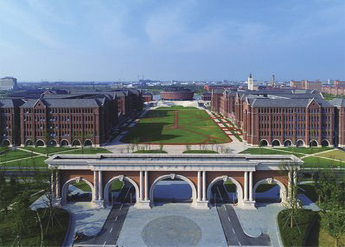Jin Yinhua, Rush towards every passion
She is a lovely girl from Northeast China, gentle towards all things in the world. She approaches science with reverence, delving into the mysteries of life. Using her soul to ignite the fireworks in her aspirations, she decorates the joys of life with her actions. In this edition, we introduce Dr. Jin Yinhua, a researcher and doctoral supervisor at ZJE."Dr. Jin YinhuaResearcher, PhD Supervisor, Tenure-Track Assistant ProfessorDr. Jin Yinhua graduated from the University of Heidelberg in Germany under the guidance of Prof. Dr. Bruce A. Edgar. She subsequently pursued postdoctoral training at Stanford University School of Medicine in the United States, mentored by Prof. Dr. Roel Nusse, a fellow of the National Academy of Sciences and an HHMI investigator. During this period, her research focused on elucidating the mechanisms by which signals from the stem cell microenvironment regulate tissue homeostasis and regeneration.By establishing a unique set of genetic, cellular, and molecular biology tools, she first revealed the mechanisms through which microenvironmental signals such as EGF and Wnt control the potential of stem cells, as well as the roles of these mechanisms in tissue regeneration and repair. In May 2023, Dr. Jin Yinhua joined Zhejiang University-University of Edinburgh Institute as a researcher and PhD supervisor. She formed the Stem Cell Microenvironment and Tissue Regeneration research group, where she primarily investigates how microenvironmental signals control cell behavior and cell interactions during tissue development and regeneration.ACADEMIC CAREERThe journey of learning began in 2003 when the Human Genome Project was nearing completion, planting the seeds of ideals in the young and tender heart. The seeds, imbued with vibrant vitality, quickly took root and sprouted, breaking through the soil, fueled by curiosity, exploration, and the quest for knowledge. Starting with the study of biotechnology at China Agricultural University, focusing on the application of technology in production, to researching plant stem cells at Seoul National University, and further delving into adult stem cells and understanding the regulation of intestinal stem cells by growth factors at the University of Heidelberg. Then, journeying to Stanford University to continue in this field, Dr. Jin, like a helmsman, held the oar, steered the course, adjusted the direction, cut through waves, and sailed towards the ideal shore.In the pursuit of biology, Dr. Jin Yinhua's journey began with interest, and she consistently nurtured that interest with the purest passion, focusing single-mindedly on watering and cultivating it. Over the years, that initial interest quietly shed its youthfulness and transformed into a deep-seated aspiration.During her academic journey, Dr. Jin Yinhua was influenced by the diligent efforts of Korean students, admired the rigorous, meticulous, and high-standard work attitude of German researchers, and was amazed by the active thinking, daring spirit, and courage to tackle cutting-edge work displayed by American researchers. Under the influence of a multicultural environment, Dr. Jin Yinhua embraced the strengths of various cultures, developed her style, and explored infinite truths in the endless river of the universe.Behind Dr. Jin Yinhua's calm and easygoing narrative, there ripples the unknown hardships and challenges. Cultural clashes, language barriers, and unfamiliar environments are tests that every international student must face. The comforting language rules, habits, and ways of thinking in one's native tongue can become barriers and misunderstandings in cross-cultural communication. In other words, what was once familiar and understood has turned into confusion.Courage is the belief that life holds onto in difficult times, a belief that time endows with enduring resilience. On this note, Dr. Jin Yinhua also provides advice: bravely step out of the comfort zone of the Chinese community, communicate more with locals, and embrace each other's cultural habits. This is indeed something that takes time and effort, but it is worth doing.SCIENTIFIC RESEARCH JOURNEY"Passionate, enjoyable, challenging" is Dr. Jin Yinhua's summary of her journey in scientific research. Maintaining a childlike curiosity is the driving force for researchers. The pursuit originates from love, and love achieves the pursuit. The scientific research career begins with curiosity and passion, and what is most precious is retaining the initial expectation after experiencing numerous challenges. In our conversation with Dr. Jin Yinhua, we can feel her passion for research and enjoyment of the process. She attributes this to the influence of two mentors.Her American mentor, despite being elderly, left a deep impression on Dr. Jin with his pure passion. His relentless pursuit of truth, continuous progress, and unwavering commitment inspired her. "Life gains value when you can find joy in your profession," he once said. Scientific research is challenging, but we can still find enjoyment in it.Her German mentor, on the other hand, is someone who truly enjoys scientific research. He finds pleasure in the seriousness of research, immersing himself in the process with a philosophical mindset and a comfortable and relaxed state. Despite the difficulties of scientific research, he manages to derive enjoyment from it, showcasing a unique approach to the scientific journey.THE JOURNEY OF LIFE Andrew Carnegie once said, "Everyone should have a strong interest or hobby to enrich the soul and add flavor to life." Wise individuals can make ordinary lives vibrant and colorful. Volleyball, comics, books, movies, travel, and everyday meals and seasons are all cherished as the most beautiful scenery in Dr. Jin Yinhua's heart, enriching her life beyond scientific research. Dr. Jin enjoys playing volleyball, having been a member of the university team at China Agricultural University, and participating in intercollegiate volleyball competitions with friends, a joyful and satisfying experience.What stands out most in Dr. Jin Yinhua's memories? Undoubtedly, it's travel. Leafing through the pages of her life, she realizes that many unforgettable memories are closely tied to her travels. Whether it's reaching for the stars in accessible Alaska, the romantic encounter with the aurora and snow near the Arctic Circle, or personally visiting the small village mentioned in the textbook's "The Last Lesson" and experiencing the wonderful overlap of reality and memory. Dr. Jin particularly emphasizes that compared to short-term tourist visits, the long-term immersive travel experienced during her overseas studies made it easier to discover vibrant corners and encounter unexpected beauty.For undergraduate students, Dr. Jin Yinhua's message is: "The guidance of good mentors is like a lighthouse at sea, guiding lost ships. Dr. Jin Yinhua wants to say to our undergraduate classmates, 'It should be a fun journey, enjoy it.' She plainly states that looking back on her academic journey, the undergraduate phase was undoubtedly the most interesting. Therefore, undergraduate students should wholeheartedly enjoy this period, striking a balance between diligent learning and embracing the pleasures of life. Fear not the length of youth, and let's explore new horizons while the fire is still burning, sipping poetry and wine in the bloom of our time!"
More


